Related Research Articles
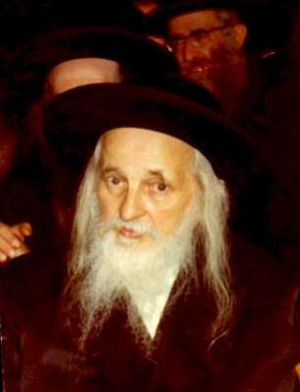
Joel Teitelbaum was the founder and first Grand Rebbe of the Satmar dynasty.

Satmar is a Hasidic group founded in 1905 by Grand Rebbe Joel Teitelbaum, in the city of Szatmárnémeti, Hungary. The group is an offshoot of the Sighet Hasidic dynasty. Following World War II, it was re-established in New York.

A shtetl or shtetel is a Yiddish term for the small towns with predominantly Ashkenazi Jewish populations which existed in Eastern Europe before the Holocaust. The term is used in the contexts of peculiarities of former East European Jewish societies as islands within the surrounding non-Jewish populace, and bears certain socio-economic and cultural connotations. Shtetls were mainly found in the areas that constituted the 19th-century Pale of Settlement in the Russian Empire as well as in Congress Poland, Austrian Galicia, Kingdom of Romania and in the Kingdom of Hungary.

Hayim Nahman Bialik was a Jewish poet who wrote primarily in Hebrew but also in Yiddish. Bialik was one of the pioneers of modern Hebrew poetry. He was part of the vanguard of Jewish thinkers who gave voice to the breath of new life in Jewish life. Being a noted essayist and story-teller, Bialik also translated major works from European languages. Although he died before Israel became a state, Bialik ultimately came to be recognized as Israel's national poet.

Yosef Haim Brenner was a Hebrew-language author from the Russian Empire, and one of the pioneers of modern Hebrew literature.

Hebrew literature consists of ancient, medieval, and modern writings in the Hebrew language. It is one of the primary forms of Jewish literature, though there have been cases of literature written in Hebrew by non-Jews. Hebrew literature was produced in many different parts of the world throughout the medieval and modern eras, while contemporary Hebrew literature is largely Israeli literature. In 1966, Agnon won the Nobel Prize for Literature for novels and short stories that employ a unique blend of biblical, Talmudic and modern Hebrew, making him the first Hebrew writer to receive this award.

Anita Shapira is an Israeli historian. She is the founder of the Yitzhak Rabin Center, professor emerita of Jewish history at Tel Aviv University, and former head of the Weizmann Institute for the Study of Zionism at Tel Aviv University. She received the Israel Prize in 2008.
Yechiel ben Joseph of Paris or Jehiel of Paris, called Sire Vives in French and Vivus Meldensis in Latin, was a major Talmudic scholar and Tosafist from northern France, father-in-law of Isaac ben Joseph of Corbeil. He was a disciple of Rabbi Judah Messer Leon, and succeeded him in 1225 as head of the Yeshiva of Paris, which then boasted some 300 students; his best known student was Meir of Rothenburg. He is the author of many Tosafot.
Hillel Halkin is an American-born Israeli translator, biographer, literary critic, and novelist who has lived in Israel since 1970.
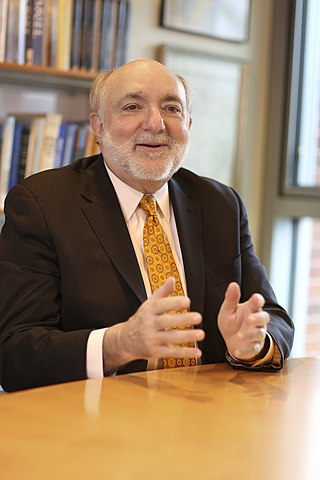
David Ellenson is an American rabbi and academic who is known as a leader of the Reform movement in Judaism. Ellenson is currently director of the Schusterman Center for Israel Studies and visiting professor of Near Eastern and Judaic studies at Brandeis University and interim president of the Hebrew Union College-Jewish Institute of Religion (HUC-JIR). He previously served as president of HUC-JIR from 2001 to December 31, 2013, and is now chancellor emeritus of that college. Ellenson is currently serving as interim president following the death of his successor, Aaron D. Panken.
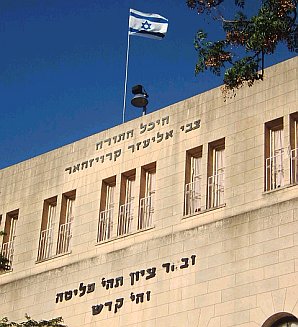
From the founding of political Zionism in the 1890s, Haredi Jewish leaders voiced objections to its secular orientation, and before the establishment of the State of Israel, the vast majority of Haredi Jews were opposed to Zionism, like early Reform Judaism, but with own reson. This was chiefly due to the concern that secular nationalism would redefine the Jewish nation from a religious community based in their alliance to God for whom adherence to religious laws were “the essence of the nation’s task, purpose, and right to exists,” to an ethnic group like any other as well as the view that it was forbidden for the Jews to re-constitute Jewish rule in the Land of Israel before the arrival of the Messiah. Those rabbis who did support Jewish resettlement in Palestine in the late 19th century had no intention to conquer Palestine and declare its independence from the rule of the Ottoman Turks, and some preferred that only observant Jews be allowed to settle there.

Samuel Joseph Fuenn, also known as Rashi Fuenn and Rashif (רשי״ף), was a Lithuanian Hebrew writer, scholar, printer, and editor. He was a leading figure of the eastern European Haskalah, and an early member of Ḥovevei Zion.
Elisheva Carlebach Jofen is an American scholar of early modern Jewish history.
Moses ha-Kohen de Tordesillas was a Spanish Jewish controversialist of the fourteenth century.

David Hanoch Yitzchak Bar-Hayim is an Israeli Orthodox rabbi who heads the Shilo Institute, a Jerusalem-based rabbinical court and institute of Jewish education dedicated to the Torah of Israel.
Yosef Hayim Yerushalmi was the Salo Wittmayer Baron Professor of Jewish History, Culture and Society at Columbia University, a position he held from 1980 to 2008.
Alfred Klee was the younger associate of Theodor Herzl and one of the earliest leaders of German Zionism.
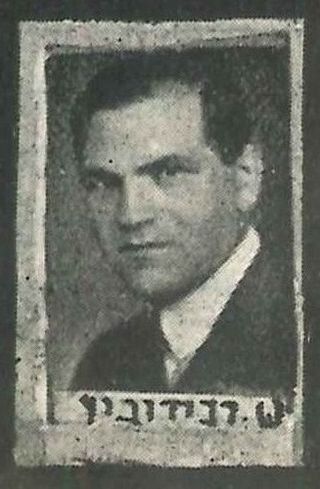
Simon Rawidowicz (1896–1957) was a Polish-born American Jewish philosopher.
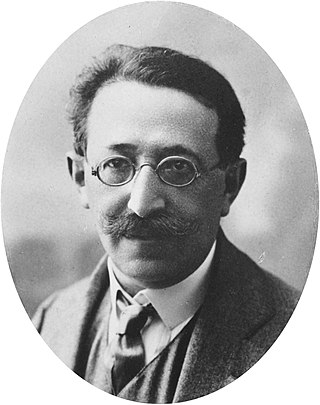
David ben Saul Frischmann was a Hebrew and Yiddish modernist writer, poet, and translator. He edited several important Hebrew periodicals, and wrote fiction, poetry, essays, feuilletons, literary criticisms, and translations.

Zakhor: Jewish History and Jewish Memory is a non-fiction book first published in 1982 by the historian Yosef Hayim Yerushalmi (1932–2009), a professor of Jewish history at Columbia University. It consists of four lectures that Yerushalmi gave as part of the 1980 series of "Stroum Lectures in Jewish Studies", now known as the Samuel and Althea Stroum Lectures in Jewish Studies, at the University of Washington in Seattle. Harold Bloom wrote the foreword for the publication. The title, Zakhor, is the Hebrew word for remember. The New Yorker described the book as "one of the most influential works on Jewish history" since the 1950s.
References
- 1 2 3 "David Myers Quits as Jewish History Center Head After Right-Wing Attacks". 29 June 2018.
- 1 2 3 4 Renaud, Jean-Paul (May 19, 2015). "David Myers awarded inaugural Sady and Ludwig Kahn Chair in Jewish History". UCLA Newsroom. UCLA. Retrieved January 1, 2017.
- 1 2 "UCLA History Department: David N. Myers".
- ↑ "Jewish Quarterly Review: Journal Information". Archived from the original on 2008-05-17.
- ↑ "Officers and Fellows". aajr.org. 2014. Retrieved 10 January 2014.
- ↑ "MK Smotrich: 'Naming him as CEO is gross malfeasance'".
- ↑ "Center for Jewish History chief's appointment sparks protest".
- ↑ "Watchdog Plans Protest over Center for Jewish History's Hosting of Anti-Zionist Group". 13 October 2017.
- ↑ "ZOA Joins Right-Wing Attack on Center for Jewish History Chief".
- ↑ "Right-wing activists target David Myers". 9 September 2017.
- ↑ Schuessler, Jennifer (12 October 2017). "Jewish Center Faces Backlash After Canceling Play Criticized as Anti-Israel". The New York Times.
- ↑ "David Myers: Wrong Choice by Center for Jewish History".
- ↑ "David N. Myers". 15 May 2015.